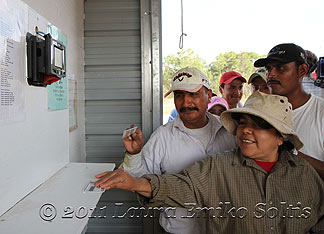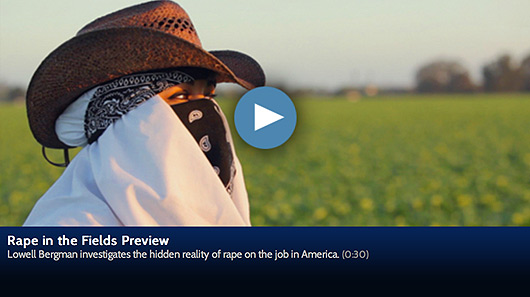“Unique in the country…” |
|
… -Andres Cediel, PBS Frontline producer, speaking with NPR about the Fair Food Program’s successful approach to combating farmworker sexual harassment
|
Cediel on the CIW’s Fair Food Program:
” … (The Fair Food Program was) the first time that we saw an economic incentive placed on anti-sexual harassment policies…
… women are therefore educated about their rights through the Program. We see auditors going out to the fields and talking to women about their experiences and creating much more awareness and also empowering people to come forward…
… What we’ve seen in other parts of the country is that sexual harassment policies are being put into place, such as in California there are sexual harassment trainings going on with supervisors. The difference is not seeing it get to the field worker level as directly as what we’ve seen in Immokalee. So it’s really, after going around the country, some of the most proactive policies that we’ve seen have been coming out of Florida.”
Tonight — Tuesday, June 25 — be sure to check out the PBS Frontline documentary “Rape in the Fields,” a searing look at the epidemic of sexual abuse of female farmworkers in the US agricultural industry.
The film is the product of a unique, year-long, collaboration among PBS’s award-winning documentary division Frontline, Univision News, the Investigative Reporting Program at the UC Berkeley Graduate School of Journalism, and the Center for Investigative Reporting. It is a powerful glimpse into of one of the darkest corners of this country’s food industry, the exploitation and daily humiliation of the women who pick and pack our fruits and vegetables.
To quote Frontline correspondent Lowell Bergman:
“These women live in fear, but they were willing to go on camera to tell their stories at great personal risk,” Bergman says. “They didn’t want to see it happening to other women.” read more
A Solution Comes to Light
Though the documentary focuses on the problem of widespread sexual harassment of women farmworkers — an understandable decision by the producers, perhaps, as it is a problem that even today remains largely unaddressed by the US produce industry, and largely ignored by mainstream America — the year-long investigation also examined several efforts around the country to forge a solution to the crisis of sexual abuse in the fields. And, if a recent NPR interview with one of the producers, Andres Cediel, is any indication, it appears that one of those programs — the CIW’s Fair Food Program (FFP) —  stood out among the rest for several reasons, including: the FFP’s unique market-based approach, its worker-driven monitoring and enforcement processes, and the concrete advances in women’s rights it has achieved in just two full seasons of operation in the Florida tomato industry.
stood out among the rest for several reasons, including: the FFP’s unique market-based approach, its worker-driven monitoring and enforcement processes, and the concrete advances in women’s rights it has achieved in just two full seasons of operation in the Florida tomato industry.
Through interviews with workers who have successfully defended their rights in Immokalee, with CIW members involved in the worker-to-worker education program on tomato farms across the state of Florida, with staff members of theFair Food Standards Council who monitor and enforce the Fair Food Code of Conduct, and with growers supporting the groundbreaking Fair Food Program, the producers of Rape in the Fields came to identify the Fair Food Program, and Florida’s tomato industry, as a bright ray of hope in an otherwise dismal landscape.
Here below is an excerpt from the NPR interview in which Mr. Cediel discusses the Fair Food Program:
And here below is the transcript:
(Min:18:59)
WGCU: “And you mentioned the Coalition of Immokalee Workers, that’s actually right here in Southwest Florida, we talk to members of the Coalition all the time. When you reached out to the Coalition of Immokalee Workers, was this something that was already on their radar? Was this something they were hearing about?”
CEDIEL: “Well, I think what’s extraordinary about what the Coalition’s doing that seems to be unique in the country as far as we can tell is that as a part of their Fair Food Program, they have included anti-sexual harassment policies.
So that, basically, it’s a deal between the buyers, which would be Taco Bell, McDonald’s, Whole Foods, and the growers, the folks who are selling the tomatoes, and the workers, that all the food that is bought through that Program was grown under these Fair Food Policies, among them policies against sexual harassment.
So they put an economic incentive for growers to make sure that women, in this case, are being treated fairly. So what we’ve found is that there are actual cases where, complaints have been made about sexual harassment in which supervisors have been fired, and even in one case that a grower was kicked out of the Program for not complying. So it was the first time that we saw an economic incentive placed on anti-sexual harassment policies, and it seems to be having an effect, in that women then are therefore educated about their rights through the Program. We see auditors going out to the fields and talking to women about their experiences and it’s creating much more awareness and also empowering people to come forward.
Now what we’ve seen in other parts of the country is that sexual harassment policies are being put into place, also, for instance in California there’s a lot of sexual harassment trainings going on with supervisors. The difference is not seeing it getting to the field worker level as directly as what we’ve seen in Immokalee. So it’s really, after going around the country, some of the most proactive policies that we’ve seen have been coming out of Florida.”
Recognition Growing; Where Are the Supermarkets?
With this latest recognition of the unique effectiveness of the Fair Food Program’s market-based, worker-driven model, it is becoming increasingly clear that the FFP and the Florida tomato industry are carving out — in a partnership supported by eleven of the country’s largest food retail companies — a powerful new approach to social responsibility in the US produce industry.
From modern-day slavery (FFP “one of the most successful and innovative programs” in the fight against modern-day slavery — White House) to social responsibility (FFP’s “independent and robust enforcement mechanism” and its ability to “innovatively addresses core worker concerns,” unique in US produce industry — United Nations) to sexual harassment (FFP “unique in the country” for its methods and success in fighting sexual harassment — PBS Frontline), the Fair Food Program is making real, verifiable progress and winning unprecedented praise.
Farmworkers, growers, and food industry workers are finally collaborating to end the decades-old nightmare of farm labor exploitation. Virtually every sector of the tomato industry, from the farm to the fork, is doing its part, with one glaring exception: the supermarket industry is conspicuously absent. Despite the example set by Whole Foods and Trader Joe’s, the vast majority of the supermarket industry — including grocery giants Publix, Kroger and Ahold — have refused to recognize the urgent need for action and have instead turned their backs on the powerful new model for change emerging in Florida’s tomato fields.
We can only hope that their executives have the courage tonight to watch Frontline’s “Rape in the Fields,” to open their minds for a moment, and to imagine their own sisters, wives, or daughters — or even themselves — trapped in the hellish reality captured in the film. Perhaps then they might stop hiding from the truth, recognize their own power and responsibilty, and embrace the Fair Food Program’s vision of a more modern, more humane agricultural industry.
We’ll be waiting.


